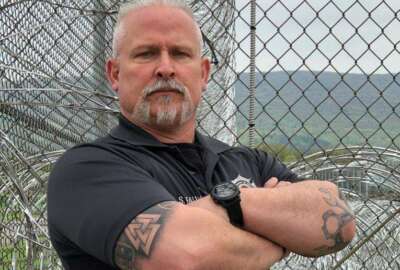
Federal prisons and coronavirus: One officer’s view
Bureau of Prisons and corrections officers don't quite see eye-to-eye.
President Trump’s former campaign chairman, the hapless Paul Manafort, is among the some 2,500 federal inmates sent to serve their sentences at home. It’s an effort by the Bureau of Prisons to reduce crowding and the threat of coronavirus.
The release was part of the BOP’s response to Attorney General William Barr’s April 3rd memorandum to BOP director to “immediately maximize appropriate transfers to home confinement” at facilities where Covid-19 is materially affecting operations. The instruction was in capital letter, boldfaced and underlined. Many published reports since then have noted a lack of transparency in how BOP has responded. My producers requested an interview with the BOP on how coronavirus was affecting its employees, and received this response: “We decline to provide an interview.”
Anyhow, Manafort was serving at a minimum-security institution in Loretto, Pennsylvania. I imagine BOP officials felt Manafort was a low risk for flight or for committing violent crime at home. Manafort’s case shows the range of what a Washington-soaked life can deliver. He reached the high-paying pinnacle of high-end lawyer, lobbyist and counselor to presidents. A politico’s politico. And ended up having been issued two sets of khakis and having to stand still five times a day while correctional officers count noses. Manafort’s mug shot shows him in green issue, so he was apparently housed in the minimum security “camp.”
Looking at an inmate in reverse, you see the range of professions encompassed by the federal government necessary to tell a Paul Manafort to keep his shirt tucked in. Members of Congress deliver laws that, if enacted, fall to the executive branch to faithfully execute. After Marshals, clerks, judges and bailiffs do their work, a case heads back to the executive branch. Cabinet secretaries, prosecutors, law enforcement investigators, policy writers, program managers, contracting officers, prison managers. Finally, where the rubber meets the road, corrections officers who must mind prisoners of all sorts.
What a vast apparatus to make sure an inmate doesn’t take an apple from the dining hall back to his dorm.
Now all the people who form the gears of that apparatus are working under the unpleasant overlay of the coronavirus. In recent weeks I’ve written about the trials and tribulations of those forced to telework and those who can’t telework by virtue of their jobs. Within the latter group are those whose jobs are inherently dangerous even without extra threats like the pandemic.
Corrections officers (don’t call them guards) manage the prisoners. That might not be inherently dangerous in an institution like Loretto. But physical danger certainly lurks close by for officers at other institutions. Even a page on the BOP web site notes, “Those who have never been in law enforcement cannot fully comprehend … how it feels when sallyport doors close, how it feels to be the lone housing officer during night shift.”
Indeed, unarmed officers are in close physical proximity to people that may have a history of brutality. Over the decades guards have been killed or subject to less-than-fatal violence. It goes with the territory.
In my interview with the president of AFGE Council 33, Shane Fausey said labor relations have “become rather challenging” under the Trump administration. The union was bargaining for a new master agreement until the pandemic halted talks, Fausey said. But one of the big issues goes back to 2005, namely staffing levels. The ranks of officers had fallen by 9,000 since then, Shane estimated.
Officers don’t simply worry about themselves. Fausey said something that surprised me. Not that violence increases “exponentially” when staffing shortages persist, which is true, but that the effects aren’t only on guards. “Especially since January of 2017 we’ve noticed the suicide rate among inmates (emphasis mine) has almost doubled.”
Notably, Fausey didn’t blame BOP management, but rather congressional appropriators. “Unfortunately we have to resort to a lot of legislative activity and garnering some support from our congressmen and Senators to get that done. The agency sometimes just can’t help itself.”
Pandemic has further strained things. Officers have big concerns there too, understandably. At the time of our interview earlier this week, Fausey said COVID-19 claimed the lives of 49 inmates and one officer. That’s out of 3,300 inmates who tested positive and 250 staff members. But he also said that of the two institutions where BOP has done mass testing, infection rates hit nearly 80% of inmates.
As for supplying guards, and inmates for that matter, with protective gear, Fausey described an agency like many others. Ill prepared, scrambling for the same initially limited supplies as everyone else, and now starting to catch up. He added that BOP officials have stonewalled inquiries.
“We have asked leadership at the Bureau of Prisons on a number of occasions, ‘hey can you give us the numbers so we can decide what institutions need them, and kind of help redistribute the supplies to the institutions that need them the most.’ And they absolutely refuse to answer all of our requests.”
Fausey called the job of correctional officer “one of the most challenging professions in the country.” Who would argue?
By the way, last week was National Correctional Officers Week, mostly postponed this year. You can guess why.
Nearly Useless Factoid
A blue whale’s tongue can weigh as much as an elephant. It’s heart can weigh as much as a car.
Source: National Geographic
Copyright © 2025 Federal News Network. All rights reserved. This website is not intended for users located within the European Economic Area.
Tom Temin is host of the Federal Drive and has been providing insight on federal technology and management issues for more than 30 years.
Follow @tteminWFED





